河北省唐山市曹妃甸区第二中学九年级英语全册 Unit 4 What would you do Sec
河北省唐山市曹妃甸区第二中学九年级英语全册 Unit 1 How do you study fo
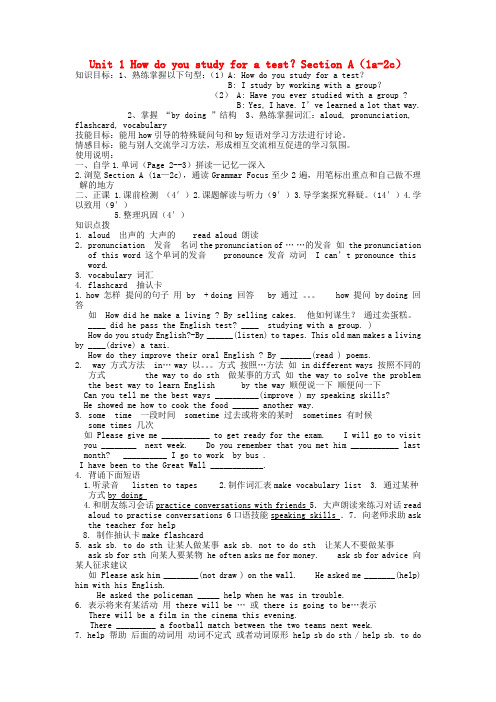
Unit 1 How do you study for a test?Section A(1a-2c)知识目标:1、熟练掌握以下句型:(1)A: How do you study for a test?B: I study by working with a group?(2) A: Have you ever studied with a group ?B: Yes, I have. I’ve learned a lot that wa y.2、掌握“by doing ”结构3、熟练掌握词汇:aloud, pronunciation, flashcard, vocabulary技能目标:能用how引导的特殊疑问句和by短语对学习方法进行讨论。
情感目标:能与别人交流学习方法,形成相互交流相互促进的学习氛围。
使用说明:一、自学1.单词(Page 2--3)拼读—记忆—深入2.浏览Section A (1a—2c),通读Grammar Focus至少2遍,用笔标出重点和自己做不理解的地方二、正课1.课前检测(4′)2.课题解读与听力(9′)3.导学案探究释疑。
(14′)4.学以致用(9′)5.整理巩固(4′)知识点拨1. aloud 出声的大声的 read aloud 朗读2.pronunciation 发音名词the pronunciation of … …的发音如 the pronunciation of this word 这个单词的发音 pronounce 发音动词I can’t pronounce this word.3. vocabulary 词汇4. flashcard 抽认卡1. how 怎样提问的句子用 by + doing 回答 by 通过。
how 提问 by doing 回答如 How did he make a living ? By selling cakes. 他如何谋生?通过卖蛋糕。
九年级英语全册 Unit 4 what would you do The 3rd Period示范教
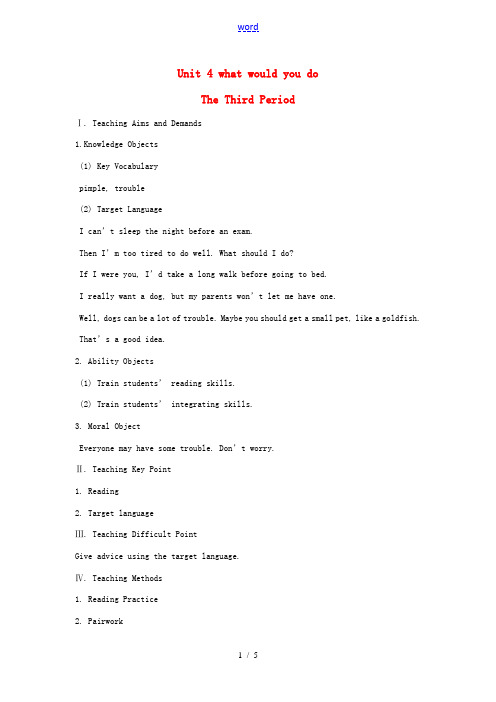
Unit 4 what would you doThe Third PeriodⅠ. Teaching Aims and Demands1.Knowledge Objects(1) Key Vocabularypimple, trouble(2) Target LanguageI can’t sleep the night before an exam.Then I’m too tired to do well. What should I do?If I were you, I’d take a long walk before going to bed.I really want a dog, but my parents won’t let me have one.Well, dogs can be a lot of trouble. Maybe you should get a small pet, like a goldfish. That’s a good idea.2. Ability Objects(1) Train students’ reading skills.(2) Train students’ integrating skills.3. Moral ObjectEveryone may have some trouble. Don’t worry.Ⅱ. Teaching Key Point1. Reading2. Target languageⅢ. Teaching Difficult PointGive advice using the target language.Ⅳ. Teaching Methods1. Reading Practice2. PairworkⅤ. Teaching AidThe blackboardⅥ. Teaching ProceduresStep Ⅰ RevisionCheck homework. Get students to talk about what they would do if a teacher criticized them. For example, a student might say I’d explain to the teacher and so forth. Step Ⅱ3aThis activity provides reading practice using the target language. Point to the problems on the left. Ask different students to read them to the class.Point out the pieces of advice on the right. Get different students to read them to the class.Point out the sample answer. Invite a pair of students to read the problem and the piece of advice to the class.S A: I’m really shy and I just don’t enjoy parties. I don’t know what to say or do.S s: If I were you, I’d talk to someone who looks friendly. Then you won’t feel so shy.Say, Please match each problem on the left with the correct advice on the right. Get students to plete the activity on their own. As they work individually, move around the room answering any questions students raise and offering help as needed. Check the answers.Answers1. c2. a3. bStep Ⅲ 3bThis activity provides oral practice using the target language.Read the instructions to the class. Invite a pair of students to read the sample conversation.S A:I can’t sleep the night before an exam. Then I’m too tired to do well. What should I do?S B: If I were you, I’d take a long walk before going to bed. That should help you relax.Say, Please think of different advice for the problems in Activity 3a.Collect suggestions from students. For example, for the third problem, a student might say, If I were you, I’d watch TV to relax my mind.Ask students to make conversations with partners using new suggestions to each problem. As they work in pairs, walk around the room offering language support as needed.After each student has a chance to play both parts, stop the activity. Get several pairs of students to say their conversations.Step Ⅳ Part 4This activity provides writing, listening and speaking practice using the target language.Read the instructions to the class. Get a pair of students to say the sample conversation to the class.S A:I really want a dog, but my parents won’t let me have one.S B:Well, dogs can be a lot of trouble.Maybe you should get a small pet, like a goldfish.S A:That’s a good idea.Write the conversation on the blackboard.Point out the sample answers in the chart.Say, What problems do you have at home? At school? Make a list in the chart. Then ask your classmates for advice and write their advice in the chart too.Get students to plete the activity in groups of four. As the groups work together, move around the room to make sure students discuss the topic in English and knowhow to fill in the chart.Check the answers by asking different pairs of students to say their conversations to the class.Answers will vary.Optional activityAsk, What would you do if there were no classes tomorrow? Ask students to write as many answers as they can. Then get students to work in pairs. One ask the other the question and see how many new answers the other is able to think of.Step Ⅴ SummarySay, In this class, we’ve done a lot of reading, speaking and writing practice using the target language.Step Ⅵ Homework(1) Review the target language by reading the conversations in Activity 3a.(2)Finish off the exercises on pages 11~12 of the workbook.Step Ⅶ Blackboard Design。
河北省唐山市曹妃甸区第二中学九年级英语全册 Unit 4 What would you do S

Unit 4 What would you do Section B(1a-selfcheck)【学习目标】.掌握词汇energetic confident permission bother not… in theslightest annoy fairly plenty of get along with … circlelistener knowledgeable represent let… down come up with…rest 及虚拟语气的用法。
重点短语1. deal with 处理、对待2. come out 出版、发表3. in public 公共的、公众的4.help (sb.)with sth = help sb.(to)do sth. 帮某人做某事5. in the slightest 一点也;根本6. plenty of 很多的、足够的7. get along well with 与…相处(得好) 8. let …down 使…失望、沮丧9. come up with 提出、想出(问题) 10. medical research 医学研究11. what if 如果…怎么办 12. be late for 迟到…13 be nervous 紧张的./ get nervous (变得)紧张的14. take a long walk 散步15. ask one’s permission 征求某人的许可16. without permission 没得到许可 17. introduce oneself 自我介绍18. a circle ofgood friends 朋友圈子19. ask one’s permission 征求某人的同意。
without permission 没有得到许可。
20.. introduce vt. 介绍 introduce sb to sb. 把(某人)介绍给(某人) introduceoneself 自我介绍重点句子。
河北省唐山市曹妃甸区南堡开发区九年级英语全册Unit4StoriesandPoemsLesson20SayItinFive课件新版冀教版
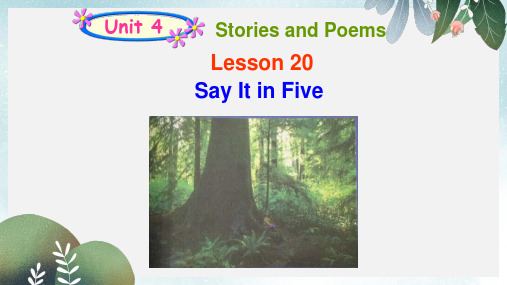
3. 他还必须继续卧床休息两天。(another) He must stay in bed for another two days. 4. 总之,自行车在日常生活中发挥着重 要的作用。(in a word) In a word, bicycles play an important role in daily life. 5. 没人谈及这个话题。(topic) No one talked about this topic.
What’s the topic of this article? 这篇文章的主题是什么?
接龙
幻灯片上单词或短语出现时,同 学应迅速读出并说出中文意思。
每人一词,按行/列依次接龙,3秒 内说不出,此行/列同学即失去此 答题机会,下一行/列同学接续。
compare passage
although
fat text line aloud
noun adjective verb adverb monkey cute jump happily
The cute monkey jumped happily.
Time for reflection
this kind of a set number of
a number of another two in one/a word
2. This kind of poem always talks about a single topic. 这类诗总是谈论一个单一的主题。
a kind/sort/type of, this kind/sort/type of+ 可数名词单数/不可数名词,动词用单数 形式。
This kind of man makes me angry. 这种人让我生气。
河北省唐山市曹妃甸区第二中学九年级英语全册unit1howdoyoustudyforatestselfcheck
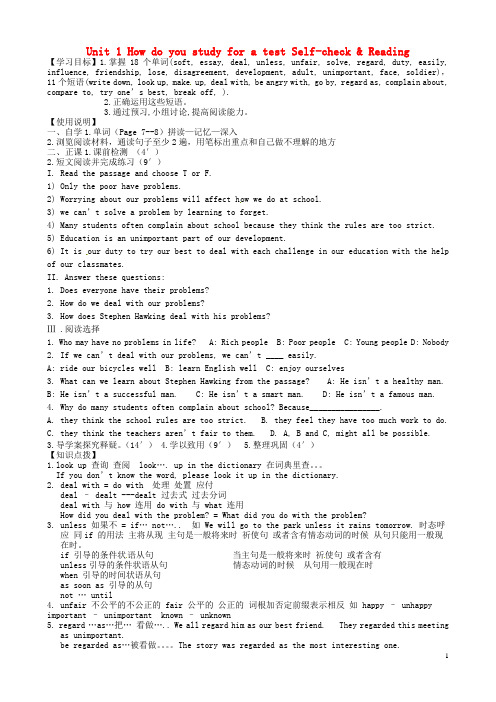
Unit 1 How do you study for a test Self-check & Reading【学习目标】1.掌握18个单词(soft, essay, deal, unless, unfair, solve, regard, duty, easily, influence, friendship, lose, disagreement, development, adult, unimportant, face, soldier),11个短语(write down, look up, make up, deal with, be angry with, go by, regard as, complain about, compare to, try one’s best, break off, ).2.正确运用这些短语。
3.通过预习,小组讨论,提高阅读能力。
【使用说明】一、自学1.单词(Page 7--8)拼读—记忆—深入2.浏览阅读材料,通读句子至少2遍,用笔标出重点和自己做不理解的地方二、正课1.课前检测(4′)2.短文阅读并完成练习(9′)I. Read the passage and choose T or F.1) Only the poor have problems.2) Worrying about our problems will affect how we do at school.3) we can’t solve a problem by learning to forget.4) Many students often complain about school because they think the rules are too strict.5) Education is an unimportant part of our development.6) It is our duty to try our best to deal with each challenge in our education with the helpof our classmates.II. Answer these questions:1. Does everyone have their problems?2. How do we deal with our problems?3. How does Stephen Hawking deal with his problems?Ⅲ .阅读选择1. Who may have no problems in life? A: Rich people B: Poor people C: Young people D: Nobody2. If we can’t deal with our problems, we can’t ____ easily.A: ride our bicycles well B: learn English well C: enjoy ourselves3. What can we lear n about Stephen Hawking from the passage? A: He isn’t a healthy man. B: He isn’t a successful man. C: He isn’t a smart man. D: He isn’t a famous man.4. Why do many students often complain about school? Because________________.A. they think the school rules are too strict.B. they feel they have too much work to do.C. they think the teachers aren’t fair to them.D. A, B and C, might all be possible.3.导学案探究释疑。
河北省唐山市曹妃甸区第二中学九年级英语全册 Unit 2 I used to be afraid o
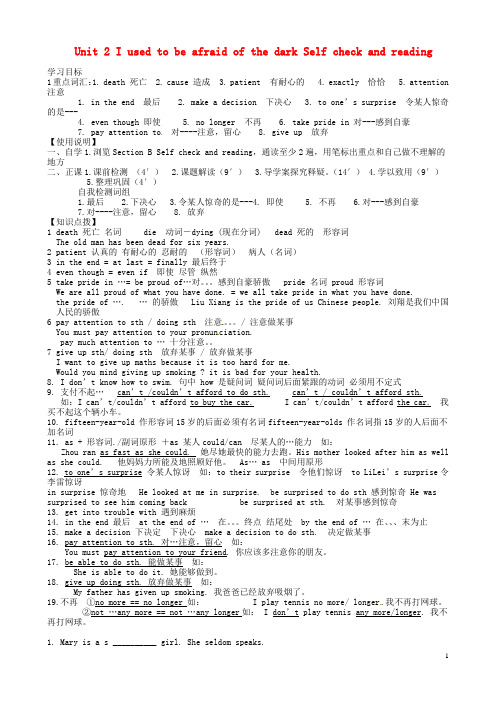
Unit 2 I used to be afraid of the dark Self check and reading学习目标1重点词汇:1. death 死亡 2. cause 造成 3. patient 有耐心的 4. exactly 恰恰 5. attention 注意1. in the end 最后2. make a decision 下决心3. to one’s surprise 令某人惊奇的是---4. even though 即使5. no longer 不再6. take pride in 对---感到自豪7. pay attention to对----注意,留心 8. give up 放弃【使用说明】一、自学1.浏览Section B Self check and reading,通读至少2遍,用笔标出重点和自己做不理解的地方二、正课1.课前检测(4′) 2.课题解读(9′) 3.导学案探究释疑。
(14′) 4.学以致用(9′)5.整理巩固(4′)自我检测词组1.最后2.下决心3.令某人惊奇的是---4. 即使5. 不再6.对---感到自豪7.对----注意,留心 8. 放弃【知识点拨】1 death 死亡名词die 动词―dying (现在分词) dead 死的形容词The old man has been dead for six years.2 patient 认真的有耐心的忍耐的(形容词)病人(名词)3 in the end = at last = finally 最后终于4 even though = even if 即使尽管纵然5 take pride in …= be proud of…对。
感到自豪骄傲 pride 名词 proud 形容词We are all proud of what you have done. = we all take pride in what you have done.the pride of …. … 的骄傲 Liu Xiang is the pride of us Chinese people. 刘翔是我们中国人民的骄傲6 pay attention to sth / doing sth 注意。
河北省唐山市曹妃甸区南堡开发区九年级英语全册Unit1StayHealthyLesson4Don’t
• If you smoke, You harm yourself, and you're also harming the people around you with your second-hand smoke.
• Smoking pollutes the environment, too. Everyone wants to live in a clean environment and breathe fresh air. In many countries, smoking in public places in now against the law.
Look and say
lung
n. 肺
Smoking can cause lung cancer.
吸烟会引起肺癌。
Look and say
Law
n. 法律
Every citizen may claim the protection of the law.
每个公民都可以要求受到法律的保护。
Look and say
change the __to_p_i_c____. 3. _E_n_c_o_u_r_a_g_e your family members to
stop smoking. 4. Eat more fruits andv_e_g_e_t_a_b_le_s__. Do
九年级英语全册 Unit 4 what would you do The 4th Period示范教
Unit 4 what would you doThe Fourth PeriodⅠ. Teaching Aims and Demands1. Knowledge Objects(1) Key Vocabularyenergetic, confident, public, in public, permission(2)Target LanguageWhat would you do if someone asked you to be in a movie?I’d say yes.2. Ability Objects(1)Train students’ ability to identify words in context.(2)Train students’ ability to use the target language.(3)Train students’ listening skill.3. Moral ObjectEnable students to realize that confidence a good personality. Ⅱ. Teaching Key Points1. Key Vocabulary2. Target LanguageⅢ. Teaching Difficult Points1. Listening practice using the target language.2. Use the target language.Ⅳ. Teaching Methods1. Listening practice2. PairworkⅤ. Teaching Aids1. A. projector2. A tape recorderⅥ. Teaching ProceduresStep Ⅰ Revision1. Check the homework exercises on pages 11~12 of the workbook.2. Say, If I had a day off today, whatwould I do.9 Encourage students togive advice using sentences beginning with if I were you,I’d...or you should….. See how many pieces of advice students are able to think of.Step Ⅱ1aThis activity reviews earlier vocabularyand introduces some new words. Introduce the key vocabulary words on page29 by showing them on the screen by aprojector.Say the words one by one and have students repeat several times.Write them on the blackboard.Read. the instructions to the class.Point to the five words above the box. Invite a student to read them to the class. Ask students to tell what each word means. For example, for the word out going, a student might say, outgoing means friendly.Focus attention on the five numbered sentences in the box. Point out the sample answer. Ask students to think about which word would work best in each blank.Get students to fill in the blanks on their own. Walk around the room offering help as needed.Ask different students to read their Sentences, filling the blanks. The rest of the class check their answers.Correct the answers.Answers1. Confident2. Outgoing3. Creative4. Shy5. EnergeticStep Ⅲ 1bThis activity provides oral practice using the target language.Read the instructions to the class.Call students’attention to the sample conversation. Invite a pair of students to read it to the class.S A :What are you like?s B :I think I’m creative and outgoing.Say, Practice in pairs. Say the sample conversation first. Then make conversations to tell each other what words in activity la describe you.Have students practice in pairs. As they work, walk around the classroom checking progress and offering language support as needed. Have a few pairs of students to share their conversations with the class.Step Ⅳ2aThis activity provides listening practice using the target language.Call students’attention to the chart. Tell them that this is a questionaire about how confident you are. Explain to students that a questionaire means a written list of questions to be answered by a number of people.Point to the list of questions underneath the headline "What would you do…" Ask different students to read them to the class. Correct any pronunciation and into- nation errors.Say ,You are to listen to a conversation between Cellia and Bill. Check the questions Cellia asks.Play the recording the first time. Students only listen.Play the recording a second time. This time students listen and check the answers Cellia asks.Check the answers.AnswersChecked questions:√the teacher asked you to give a speech in front of the whole school?√someone asked you to be in a movie?TapescriptGirl 1:I just did a personality survey in Teen Time Magazine. It tells you how confident you are.Boy 1:Oh? How did you do, Cellia?Girl 1:I don’t know yet. But it’s a really interesting test. You should try it, Bill.Boy 1:OK.Girl 1: How about question 17 What would you do if the teacher asked you to give a speech in front of the whole school?Boy 1: I’d say I had a cold and couldn’t speak. I would be afraid to make a speech in front of the whole school.Girl 1: How about this movie question? What would you do if someone asked you to be in a movie?Boy 1:Oh,I’d say no. I’d be too nervous. What’s the next question?Girl 1:Let’s see…Step Ⅴ 2bThis activity provides listening practice using the target language.Point to the list of answers underneath the headline "I would…" Ask different students to read them to the class.Say, You are to listen to the same conversation again. This time listen to both the questions and answers. Gircle the letter of the correct answers to each question. Play the recording again. Students listen and circle Bill’s responses.Check the answers,AnswersBoth answers should be b.Step Ⅵ2cThis activity provides oral practice using the target language. Point to the sample conversation in the box. Invite a pair of students to read it to the class.S A: What would you do if someone asked you to be in a movie?S B: I’d say yes.Write it on the blackboard.Point out the personality survey in Activity 2a. Say, Please work in pairs. Ask and answer the questions in the survey.Get students to work in pairs. As the pairs work together, move around the classroom offering language and pronunciation support as needed.Check the answers by asking different pairs to share their conversations with the class.Step Ⅶ SummaryPointing to the blackboard, say we’ve learned these vocabulary words and the target language.Step Ⅷ HomeworkGet students to make as many conversations as they can using the questions and answers in the personality survey in Activity 2a.Step Ⅸ Blackboard Design。
河北省唐山市曹妃甸区第二中学九年级英语全册 Unit 1 How do you study for
Unit 1 How do you study for a test?Section B(3a-4)【学习目标】1.掌握单词(realize, matter, afraid, secret, term, trouble, fast),laugh at sb 、 take notes 、enjoy doing sth 、first of all 、to begin with、later on句型—First of all, it wasn’t easy for me to understand the teacher when she talked.—I was also afraid to speak in class, because I thought my classmates might laugh at me.—I decided to take lots of grammar notes in every class.—She had trouble making complete sentences.2.通过预习,小组讨论,提高阅读能力。
【使用说明】一、自学.单词拼读—记忆—深入认识到意识到了解到______ 关系重要要紧______ 害怕_____ 秘密_____ 学期______ 麻烦使麻烦困难忧虑______ 迅速的快的______.浏览Section B 3a,通读短文至少2遍,用笔标出重点和自己做不理解的地方二、正课1.课前检测(4′)2.阅读3a,回答下列问题1.Why couldn’t the writer understand the teacher at the begin ning?2.Why was the writer afraid to speak in class?3.What′s the secret of becoming a good language learner?4.How did the writer solve(解决 )the grammar challenge?5.What other ways can you think of to improve your English?你能在3a中找到下面的短语吗?试着写下来。
九年级英语全册 Unit 4 what would you do The 1st Period示范教
Unit 4 what would you do?I. Analysis of the Teaching Material1. Status and FunctionIn this unit students learn to talk about imaginary situations. Such topic enables students to activate their imagination and raises learning interest of students. All the students are active in such activities.(1) The first period introduces the key vocabulary words and the target language in this unit. The topic, what would you do if you had a lot of money, makes the introduction easier.(2) In the second period, students will learn to give advice to someone who is in an embarrasing situation by listening and pairwork activities with the target language.(3)All the activities in the third period are designed to give students a rein forced practice in the use of the target language.(4)In the fourth period, the first part is a vocabulary expansion activity. The other activities provide students with much integrating practice using the old and new target language.(5) The fifth period provides students with much reading and writing practice. So it’s helpful to improve students’ reading and writing skills.(6)The Self check in the sixth period shows students what they have learned. The making sentences and writing an activities are used to train students’ ability of reading and writing.2. Teaching Aims and Demands(1)Knowledge ObjectsTo make students grasp how to talk about imaginary situations.To make students grasp how to give advice using the target language.(2) Ability ObjectsTo train students’ listening, speaking, reading and writing skills.To train students’ municative petence.(3) Moral ObjectsImaginary situations are unreal. Do remember: it’s really cool to realize your dream through great efforts.Two heads are better than one. Be ready to help others.In the United States, teenagers get their pocket money by helping parents with housework. It is a little different from that in China.3. Teaching Key PointsTo learn the key vocabulary words and the target language.To make students use the target language to give advice.4. Teaching Difficult PointTo train students’listening, speaking, reading and writing skills by many different kinds of activities.5. Studying WaysTeach students how to municate with others.Teach students how to give advice when someone is in trouble.Ⅱ. Language FunctionTalk about imaginary situations.Ⅲ. Target Language1. What would you do if you won a million dollars?I’d give it to medical research.2.I can’t sleep the night before an exam.What should I do?If I were you, I’d take a long walk before going to bed.Ⅳ.Structures1. Second conditional2. Should for adviceⅤ. Vocabularylottery, million, pimple, energetic, confident, shirt, tie, medical research Ⅵ. Recyclingcharity, present, fruit, vegetable, snack, shy, creative, outgoing, nervous, relax,late, tiredⅦ. Learning Strategies1. Matching9. Listening for key wordsⅧ. Teaching TimeSeven periodsThe First PeriodⅠ. Teaching Aims and Demands1.Knowledge Object(1) Key Vocabularylottery, million, medical, research(2) Target LanguageLook. This girl won a million dollars in the lottery.Wow! What would you do if you won a million dollars?I’d give it to medical research.(3)StructureI would/I’d do2. Ability Objects(1) Train students’ listening skill.(2) Train students’ municative petence.3. Moral ObjectIf you won a million dollars, you’d buy a big house, buy a car and so forth. However do remember it’s really being cool to realize your dream through great efforts. Ⅱ.Teaching Key Points1. Target language2. The structure: I would/I’d doⅢ. Teaching Difficult PointThe structure: I would/I’d doⅣ. Teaching Methods1. Scene teaching Method2. Teaching by induction3. PairworkⅤ. Teaching AidA tape recorderⅣ. Teaching ProceduresStep Ⅰ RevisionReview the structure "should be allowed to" by asking students to make sentences about school rules.Step Ⅱ1aThis activity focuses on vocabulary and structures introduced in the unit.Read the instructions to the class.Call students’ attention to the words in the box. Ask a student to read them to the class.Say, What would you do if you had a lot of money? Add more ideas to the list. Then share your answers with other students.Get students to plete the task. First individually, then in groups.As they work, walk around the room checking progress and offering any help theymay need.Collect answers from students on the blackboard.Answers will vary but should include a mixture of ideas for helping themselves and others.Step Ⅲ 1bThis activity gives students practice understanding the target language in spoken conversation.Read the instructions to the class.Read the question in the speech bubble.Explain the word lottery to students.Say, You will hear teenagers talking about what they would do if they won the lottery.Point to the pictures. Ask students to describe them one by one.For example, for Picture One, a student might say, "If I won the lottery, I’d buy a big house."Point out the sample answer. Say, The first picture you will hear about has the number one on it.Play the recording for the first time.Students only listen.Play the recording again. This time students listen and number the pictures in the order they hear them.Check the answers.Answers2,1,4,3TapescriptGirl 1: Hey, did you see this newspaper article? A girl won a million dollars in the lottery. She was only 14.Boy 1: Wow, how luck!Girl 1: What would you do if you won the lottery?Boy 1:If I won the lottery, I’d give the money to the 200. I want to help the pandas. Girl 1:That’s a good idea! I know what I’d do. If I won the lottery, I’d buy a big house for my family.Girl 2: Really? I’d put the money in the bank. Then I’d just watch it grow! Boy 2: Hmmmm… I think I’d give the money to medical research. I’d want to help other people.Step Ⅳ1cThis activity provides oral practice using the target language.Read the instructions to the class.Call students’ attention to the conversation in the box. Explain the vocabulary words million and medical research. Invite a pair of students to read it to the class. S A :Look! This girl won a million dollars in the lottery.S B: Wow ! What would you do if you won a million dollars?S A: I’d give it to medical research.Write it on the blackboard.Say, Pretend you are the people in the picture. Talk with your partner about what you would do if you won a million dollars.Get students to work in pairs. As they work in pairs together, walk around the room offering language support as needed.After students have had a chance to practice several exchanges, ask pairs to e to the front of the classroom and act out their conversations.Step Ⅴ SummaryIn this class, we’ve learned some vocabulary words and the target language what would you do if you won the lottery? I’d give it to medical research.Step Ⅵ HomeworkIf you had a large amount of money, e, g. ¥100,000 what would you buy? Please write down each item and its cost to see when you will spend the full amount. And bring your lists to class tomorrow.Step Ⅶ Blackboard Design。
- 1、下载文档前请自行甄别文档内容的完整性,平台不提供额外的编辑、内容补充、找答案等附加服务。
- 2、"仅部分预览"的文档,不可在线预览部分如存在完整性等问题,可反馈申请退款(可完整预览的文档不适用该条件!)。
- 3、如文档侵犯您的权益,请联系客服反馈,我们会尽快为您处理(人工客服工作时间:9:00-18:30)。
Unit 4 What would you do Section B(1a-selfcheck)【学习目标】.掌握词汇energetic confident permission bother not… in theslightest annoy fairly plenty of get along with … circlelistener knowledgeable represent let… down come up with…rest 及虚拟语气的用法。
重点短语1. deal with 处理、对待2. come out 出版、发表3. in public 公共的、公众的4.help (sb.)with sth = help sb.(to)do sth. 帮某人做某事5. in the slightest 一点也;根本6. plenty of 很多的、足够的7. g et along well with 与…相处(得好) 8. let …down 使…失望、沮丧9. come up with 提出、想出(问题) 10. medical research 医学研究11. what if 如果…怎么办 12. be late for 迟到…13 be nervous 紧张的./ get nervous (变得)紧张的14. take a long walk 散步15. ask one’s permission 征求某人的许可16. without permission 没得到许可 17. introduce oneself 自我介绍18. a circle ofgood friends 朋友圈子19. ask one’s permission 征求某人的同意。
without permission 没有得到许可。
20.. introduce vt. 介绍 introduce sb to sb. 把(某人)介绍给(某人) introduceoneself 自我介绍重点句子。
1. If I were you , I’d wear a shirt and tie. 如果我是你,我就会穿衬衫打领带。
2. If I were yo u , I’d take an umbrella. 如果我是你,我就带把伞。
3. What would you do if you won a million dollars ?4.. What if everyone else brings a present? 如果别人都带了礼物怎么办?5. You should eat lots of fruits and vegetable and drink lots of water. 你应该吃大量水果、蔬菜,大量喝水。
6. What are you like ? I think I’m outgoing.你的性格如何?我想我很外向。
7. You would also rather stay at home and read a good book than go to a party. 【使用说明】一、自学1.浏览Section B (1a—selfcheck),通读至少2遍用笔标出重点和自己做不理解的地方二、正课1.课前检测(4′) 2.课题解读与听力(9′)3.导学案探究释疑。
(14′)4.学以致用(9′)5.整理巩固(4′)【知识点拨】1. energetic 有活力的,精力充沛的形容词 energy 能量活力名词2. confident 有信心的形容词 be confident of…对。
有信心 = have confidencein …confidence 信心名词3.permission 允许许可名词 with one’s permission 经过某人许可 without one’spermission 未经某人许可 ask one’s permission 征求某人许可4. not … in the slightest = not … at all 根本不。
5. plenty of …充足的大量的。
6. get along with sb. 与某人相处。
get well on / along with sb. 与某人相处的好The man is very easy to get on well with. 注意不能省略with7.know 知道动词 knowledge 知识不可数名词 knowledgeable 知识渊博的8. let… down 让某人失望e up with。
想出提出 = think up = think of10.. rest 其余剩余部分 the rest of。
其他的。
绝对不能说the rest。
必须有of 如 the rest of the boys 其余的男生不能说 the rest boys11.give a speech 做演讲 = make a speec h12. all 和 whole 的区别 all the … the whole…如 all the afternoon the wholeafternoon 整个下午13. be afraid of sth . = be terrified of sth . 害怕某事物be afraid of doing sth = be terrified of doing sth. = be afraid to do sth . 害怕做某事He is afraid of speaking in front many people. = He is terrified of speaking infront of many people . =He is afraid to speak in front of many people.14. have a cold 感冒 = catch a cold have a fever 发烧15. in public 在公众场合16. advice 建议不可数名词 some advice / a piece of advicegive sb advice on … 给某人关于某方面的建议 Can you give me some advice on howto learn English?17. in face 实际上18.win 赢后面加奖项比赛 beat 赢打败后面加人或队19.solution to the problems 问题的解决方案20. in front of 在外部的前面 in the front of …在内部的前面21 would rather do sth. than do sth. 宁愿做…也不….= would do sthrather than do sth . 如 I would rather walk than run. I would rather stay athome than go to a party.22. invite sb. to do 邀请某人做某事如:Lily invited me to go to her home for supper. 莉莉邀请我去她家吃晚饭。
invite 邀请后面没有人的时候用被动 I didn’t see you at the party. Oh ,I wasn’t invited.23. 询问某人的性格特点 What is …. Like? 答语用性格特点回答询问某人外貌 What does … look like? 答语用外貌回答当堂检测1. I feel c__________ about my futu re. I believe I have a safe and bright future.2. Don’t b__________ me . I’m thinking.3. I asked his p___________ to usethe car.4. He is an e____________ man. He is hardly ever tired.5. Tom i__________ himselfto us on the first day.6. She sings English songs f__________ well.7. You look unhappy . What a__________you?8. The girl is a little shy. She has a small c___________ of friends.9. My friend Jim is a good l__________ when we get together.10. C_________ people usually like art a nd music.11. Social s________ do n’t bother you in the s______, because you are so confident.But you might a________ other people.12. He would rather _________ (read) at home than _________(play) volleyball.( )1.What _______ you do if you won plenty of money ? A. will B. shallC. wouldD. do( )2.You like running rather than ________. A. walk B. walking C. towalk D. walks( )3.I’d invite her ______ dinner at my house . A. have B. to have C.had D .having( )4.Gina is very clever .She is __________. A. confident success B.confident of success C. confident of successful D. confident forsuccess( )5.The rest of the students __ in the zoo for an hour. A. has been B. have beenC. has gone D .have gone( )6.On such a hot day, I would rather _______ at home than _____ out in the sun.A. to stay , goB. to stay, to goC. stay , to goD. stay , go( )7.When you meet any problem ,you’d better ask your teacher for _________.A. some advicesB. some adviceC. a few advicesD. few advice( )8.If a friend said _________ about you, would you care about what he said?A. nothing bad B .bad something C. something well D. something bad( )9.Tom is very shy. He is afraid ________ in public. A. to speak B. say C.talked D. telling( )10.”What is your English teacher like ?” “__________________” A. He likes fruit and vegetables. B. He is very kind . C. He is fine .D. He is 30 years old.1. 你能想出其他办法解决这个问题吗? Can you ______ _______ _______ other ways tosolve the problem?2. 我宁愿去上海也不去海南. I _______ ________ _______ to Shanghai _______ ______to Hainan .3. 他说与那个女孩相处得很容易. He said that it was very easy _______ _______ _______ with the girl.4. -- 他是个什么样的人? _________ ________ he ___________?-- 他很开朗又很自信. He is very ___________ and _______ __________.5. 他未经允许就进了老师的办公室. He went into the teacher’s office _________ __________.1.We would rather buy some books _____ some snacks. A.in B.since C.of D.than2. It’s cold .I w ould rather_in bed than_a walk outside.A..lie; take B.to lie:to take C.lie: to take Dto lie; taking。
